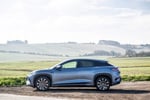There are many stereotypes and jokes about people from ‘up north’ being more friendly than those who live inside the M25. To what extent this is true is open to speculation.
Some years ago, one of our students, who ran a BMW dealership in Huddersfield, complained that he was being penalised because his ‘customer satisfaction’ scores were the lowest in his group. The irony was that his customer retention and loyalty were the highest.
After some research, the conclusion was reached that people from that part of the country would never say they were ‘extremely satisfied’ if they were happy – they would simply describe it as being ‘satisfied.’ (Please note that this is not a comment on the outlook on life of the inhabitants of this esteemed town, but simply that geography and local culture affect perceptions as do house prices and the availability of disposable income.)
There appears to be a growing trend of random surveys predicting the future of car sales and therefore dealerships. All of this research is very commendable, but is often a little oddly constructed. One particular article, based on a survey by Servicing Stop, claimed 64% of UK motorists were “likely to head online to purchase their new or used car”. A notable piece of information was secreted away at the bottom of the article, however.
The research had been undertaken in March 2018 and involved a survey of 1,006 motorists in London. There is a major question as to whether Londoners are representative of all ‘UK motorists’ mentioned above.
Londoners’ use of cars is different to much of the rest of the UK. It has the anomaly of traffic congestion as well as a congestion charge; residential parking is often restricted and in places has to be paid for; and ‘Boris’ bikes are plentiful along with a comprehensive public transport system.
Compare this to Leicester, a hundred miles north. There is no congestion charge, limited traffic apart from during the school run, no Underground or push bikes on street corners.
In Leicester, the majority of the dealerships are shared between two family businesses and Sytner. The dealerships and the people involved are well known, they sponsor the local sports teams and are seen at all the main social events that take place in the city. They have built businesses based on relationships.
Of course, there will be people in Leicester who will buy a car ‘online’, but it is highly unlikely the numbers will match those described in the London survey.
Much of what is written about our sector appears to be London-centric, which is unhelpful in producing a realistic scenario of the future of the retail automotive sector.

















Login to comment
Comments
No comments have been made yet.